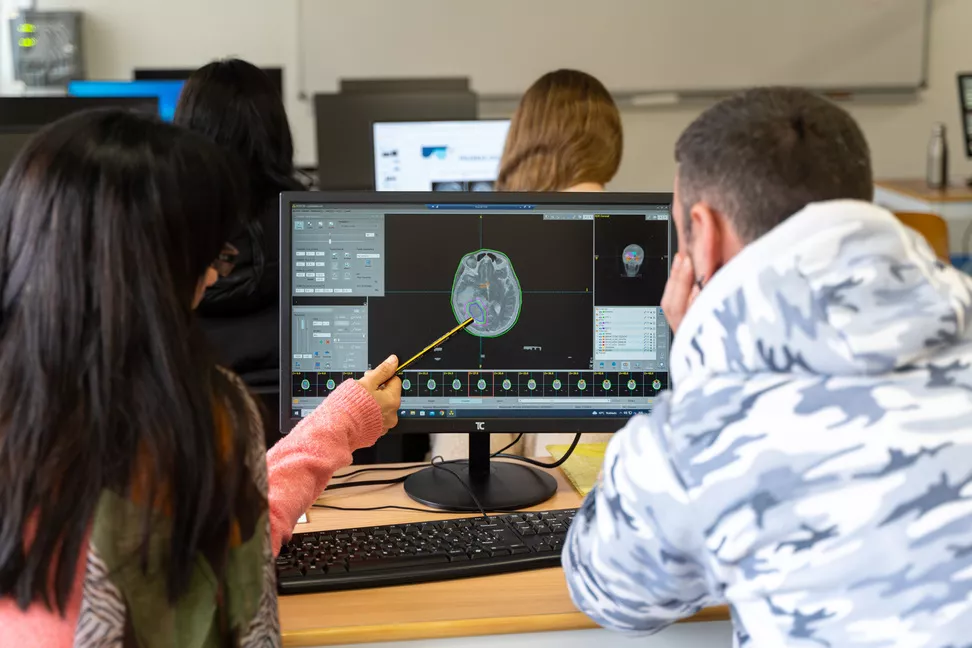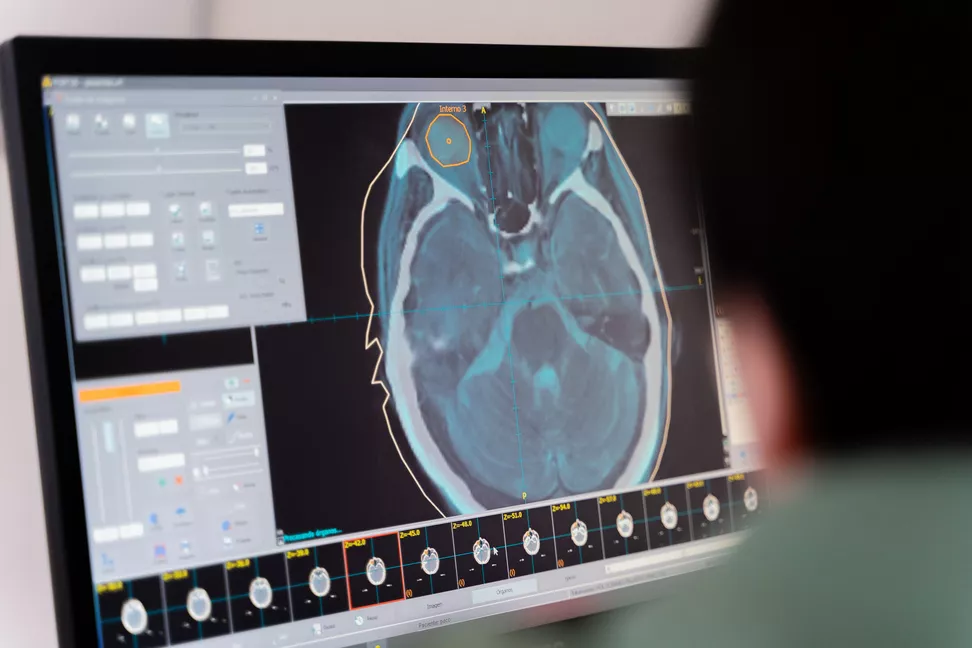The holder of this diploma will have acquired the General Competence with regard to:
- Applying treatments with ionizing radiations under medical prescription;
- Using equipment provided with sealed radioactive sources or radiation generators;
- Applying general and specific radioprotection regulations;
- Attending patients during their stay in the unit;
- Carrying out procedures of radiation protection in hospitals, following regulations on quality assurance and the protocols established in the health care unit.
| Professional Module | Hours-total | Year |
| Physical Foundations and Equipment | 198 | 1st |
|
Anatomy through Images
|
231 | 1st |
|
Radiation Protection
|
132 | 1st |
|
Treatment Simulation
|
165 | 1st |
|
Professional English
|
60 | 1st |
| Personal itinerary for employability I | 120 | 1st |
| Digitalization applied to productive sectors | 60 | 1st |
|
Patient Care
|
132 | 2nd |
|
Physical and Clinical Dosimetry
|
90 | 2nd |
|
Treatments with Teletherapy
|
150 | 2nd |
|
Treatments with Brachytherapy
|
150 | 2nd |
| Personal itinerary for employability II | 63 | 2nd |
| Sustainability applied to productive sectors | 36 | 2nd |
|
Intermodular project
|
50 | 2º |
| Optional modules | 84 | 2nd |
Access to the High-level courses or modules requires compliance with at least one of the following conditions:
- To be in possession of the Post-compulsory High School Diploma or a certificate proving that all subjects of the Post-compulsory High School have been passed.
- To have passed the third year of the Unified and Polyvalent Baccalaureate (BUP): Accreditation through academic certification of having passed all subjects leading to the Post-compulsory High School regulated by Law 14/1970, of 4 August, on General Education and Financing of Educational Reform, after completing the third year of aforesaid studies (Order EFP/1210/2021 of November 2, which establishes the equivalence, for the purposes of access to vocational training courses, of certain studies and qualifications prior to the current education system).
- To have passed the second year of the Experimental Post-compulsory High School (Bachillerato experimental).
- To be in possession of a Technician certificate (Intermediate-level Vocational Training).
- To be in possession of a Higher Technician or Specialist Technician certificate, or equivalent for academic purposes
- To have passed the University Orientation Course (COU).
- To be in possession of any university degree or equivalent.
- To have passed the entrance exam for higher-level training courses (it will be required to be at least 19 years old in the year the test is taken or 18 for those who have a Technician’s degree).
- To have passed the university entrance exam for those over 25 years old.
Either you work:
- In the health sector, in public institutions and bodies and in private enterprises, in radiotherapy oncology units, in hospitals radiophysics services, in technical units of radiation protection and in research centres.
They will work under the supervision of the corresponding doctor and the supervisor of the facility, with the corresponding accreditation of radiation installations operator awarded by the Spanish Nuclear Safety Council. Their professional activity is regulated by the State Health Administration.
Or you continue studying:
- Professional specialization courses.
- Another Higher-level Vocational Training course with the possibility of establishing validations of professional modules in accordance with current regulations.
- University studies: this course allows you to access all areas of science (health science degrees, science degrees, and architecture and engineering degrees), with the possibility of establishing validations in accordance with current regulations.
What are the career opportunities?
- This professional works primarily in the healthcare sector, within the public or private sector, in potentially polluting productive sectors and in national, regional, and local administrations in services related to health and/or the environment.
What am I going to learn?
- Organizing and managing the technician’s work area within the hospital’s radiotherapy and/or radiophysics department, following standardized procedures and applying storage and inventory control techniques.
- Differentiating between normal and pathological images at basic levels, applying anatomical criteria.
- Verifying the operation of the equipment, applying quality and safety procedures.
- Verifying the quality of the medical images obtained, following suitability and quality control criteria.
- Preparing the necessary accessories for radiotherapy treatment simulation, using appropriate materials.
- Applying initial healthcare techniques, following the unit’s technical procedures.
- Obtaining images to simulate radiotherapy treatment, using appropriate accessories according to the patient’s characteristics and body region.
- Performing clinical dosimetry through virtual treatment simulation.
- Applying radiotherapy treatments following treatment optimization criteria.
- Performing physical dosimetry of treatment equipment according to the conditions of the quality assurance program.
- Applying radiation protection procedures according to established protocols.
These teachings include the knowledge required to carry out basic level activities for the prevention of occupational risks.









